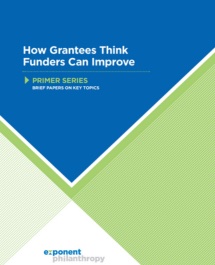Site Search
- resource provided by the Forum Network Knowledgebase.
Search Tip: Search with " " to find exact matches.

A new nonpartisan resource, Foundation Funding for U.S. Democracy, provides data about foundations and their democracy-related grantmaking in a structured, contextualized, and visual format. Foundation Funding for U.S. Democracy was created through a partnership of eight funders in the field, including the Rita Allen Foundation, and is being developed by the Foundation Center.
The tool allows funders, nonprofits and other interested parties to sift through data on the $1.7 billion (and counting) granted by foundations to strengthen civic engagement in the United States since 2011. For the first time, we have an open tool for visualizing who gave how much to whom for what. While the tool and the data will continue to develop, it already gives a tremendously useful view of opportunities for greater partnerships and knowledge in the field—both for funders and for the organizations, small and large, established and emerging, working to strengthen our democracy. As Kelly Born of the Hewlett Foundation, another of the project partners, writes in a post introducing the tool: “As useful as this data set and visualization will be for foundations already working in the field or new funders considering entering it, the real killer app for this work will be to help grant seekers.”
The New Jersey Arts and Culture Renewal Fund has awarded nearly $600,000 in grants to nonprofits that will use the funds to help artists, teaching artists and history professionals recover from the financial devastation of the pandemic.
The grants, the third round of funding awarded by NJACRF, brings the grant total to more than $4.5 million in support to 172 nonprofits in the arts and culture sector. The fund, founded in 2020 as a way to help the arts during the pandemic, is hosted by the Princeton Area Community Foundation.
Jeremy Grunin, co-chair of the NJACRF and president of the Grunin Foundation, said the grants correspond to a name for the organization – which now views itself as a vehicle for renewal.
“Recovery to renewal signifies a shift from crisis support to an opportunity to change the actual system itself,” he said. “We always knew that smaller nonprofits most vulnerable to disruptions and those historically underfunded prior to the pandemic were going to need longer-term support.
“The New Jersey Arts and Culture Renewal Fund will create an additional resource of fast and flexible funding that wasn’t previously available – helping to build a much stronger arts, cultural, and historical ecosystem in New Jersey.”
The grants announced today total $592,501 and will be awarded to nonprofits that will act as intermediaries, re-granting the funds to artists, teaching artists, and history professionals.
